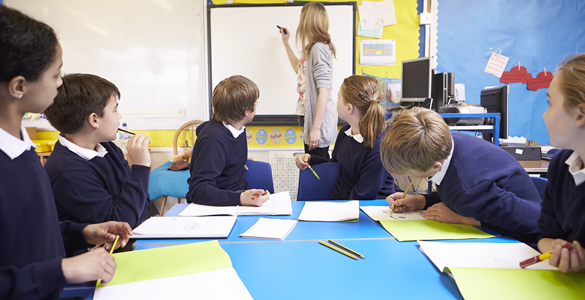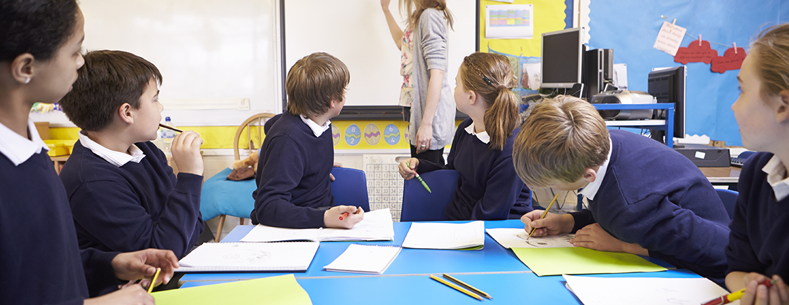The Welsh Government announced on 9 July that all pupils would return to schools on a full-time basis from the start of the new term on 1 September, subject to coronavirus transmission conditions.
This article was last updated on 15 May 2020.
The role of schools has significantly changed as a result of the coronavirus outbreak. They are currently closed for the statutory provision of education and are instead playing a key role in enabling the response to coronavirus.
The Welsh Government published updated guidance on 17 April for schools making provision for children of critical workers and for vulnerable children, to supplement its initial guidance on 20 March when schools closed for general provision.
Closure of schools for general provision
Schools across Wales stopped operating as normal on Friday 20 March. They closed for statutory education provision and are now only open for certain pupils.
With the suspension of their usual role, the Minister for Education, Kirsty Williams, has said that for the time being, schools have a ‘new purpose’:
They will help support those most in need, including people involved in the immediate response to the coronavirus outbreak.
The Welsh Government has also prioritised supporting and safeguarding ‘vulnerable pupils’.
In many cases, provision is being made via a ‘hub’, whereby pupils from a number of schools attend a single location (usually a school site) with staff drawn from across these schools.
Changes are 'not imminent' and will be phased
The Minister told the Children, Young People and Education (CYPE) Committee on 28 April that a change to the current situation regarding schools is ‘not imminent’ and that, when there are changes, there is likely to be a phased return. The Minister said:
It is not feasible, in this sense, that we would move from where we are now to what all of us would regard as normal education and what the operation of schools looked like before the start of this pandemic.
The Minister has said there are ‘five key principles for schools’ return’ and gave more information on these in a written statement on 28 April. In summary, these five considerations are:
- The safety and well-being of pupils and staff;
- Schools’ contribution to the national effort to combat coronavirus;
- Confidence amongst parents, pupils and staff – based on evidence and information – so they can plan ahead;
- Prioritising learners at key points of their education, including disadvantaged pupils;
- Practical considerations such as social distancing, managing attendance and wider protective actions.
The Minister's statement in Plenary on 29 April reiterated that there would be a phased approach.
The UK Government plans for primary schools in England to reopen to certain year groups from 1 June (the day after the scheduled half term holiday), subject to its five key tests (PDF, p11) being satisfied at the time.
The Welsh Government has ruled out schools in Wales reopening on 1 June and has set out a ‘traffic light’ approach to lifting lockdown, including priority groups of pupils returning to school in a phased approach (Amber) before all children and students can return (Green). However, the Welsh Government has not given any anticipated dates for such changes and said this will depend on the level of the coronavirus transmission rate (R).
More detail is given in the Welsh Government’s decision framework for the next phase of education and childcare, which says that so long as social distancing measures are needed schools and providers will be limited in how many children/learners they can accommodate at any one time.
One of our other articles discusses how Wales and other UK nations plan to exit lockdown more generally, beyond education.
Which children are eligible to still attend school?
The Minister issued a statement on 20 March, setting out which pupils would be eligible for the new provision in schools. These are pupils who are vulnerable or whose parents’ work is either critical to the coronavirus response or included in a list of critical sectors. These critical sectors have been compiled jointly by the devolved governments and the UK Government.
For the purposes of eligibility for the current provision, the Welsh Government has defined vulnerable pupils as children with a social worker and children with statements of special educational needs who would most benefit from the provision. Children who have a social worker include those with care and support or support plans, children on the child protection register, and children who are looked after. The Welsh Government has expanded its definition of vulnerable children so that local authorities have the flexibility to offer a place in hubs to those on the edges of receiving care and support if they are known to be vulnerable by the school or family support services.
The Welsh Government has issued guidance to hubs and schools, which is intended to support the development of effective provision for children of critical workers and for vulnerable children.
The Welsh Government has also put in place arrangements for pupils eligible for free school meals to continue receiving these until the end of August.
The Minister has said that schools are now an ‘emergency service’ and even a parent who is a key worker should consider ‘very carefully’ whether they could do their job from home, or whether they could put in place safe alternative childcare arrangements, before seeking to send their child to school.
The Welsh Government is publishing weekly data on the numbers and proportions of children and staff attending local authority education and childcare settings.
Continuity of learning for pupils at home
The Welsh Government has said that the education system ‘remains of central importance’ and its ‘task is to find ways to help our children keep learning’, which means ‘enabling remote learning and planning for how we can best help children through this time’. Schools are therefore expected to support pupils’ learning from home, through the use of online resources such as Hwb.
The Welsh Government says its priorities are:
- the safety and physical and mental health of all learners and the education workforce in Wales;
- the ability of all learners to keep learning;
- learners’ transition back into school and onto the next phase of their learning when it is safe to do so.
On Monday 20 April, which would have been when schools returned after the Easter holidays, the Welsh Government published its ‘Stay Safe. Stay Learning: continuity of learning’ policy statement. This sets out what is being done to provide learning resources through the online platform Hwb. The first elements of this work are to:
- address the digital exclusion by working with local authorities and schools on making access to Hwb and its learning opportunities more widespread, and addressing equipment and connectivity issues;
- provide guidance and support to school staff in developing practice in the new way of learning;
- provide guidance and support to schools on using Hwb to continue doing school business.
The Welsh Government issued further guidance for schools, parents and carers on 23 April.
The Sutton Trust has released a report on the impact of school shutdown on social mobility, which indicates a correlation between families’ socio-economic circumstances and the amount of home learning undertaken by children. The report is based on research on England, although its findings are likely to also be applicable in Wales. Some of the reasons home learning might exacerbate inequality relate to access to technology and the CYPE Committee questioned the Minister about this on 28 April.
The Welsh Government has pointed to its existing digital education services, including Hwb and the free provision of Microsoft Office for families of school pupils. However, the Minister recognised that this issue remains ‘crucial’ and said government officials are ‘working with local authorities to ensure that all children have access to both the hardware and the connectivity they need’.
What guidance is there for school staff, head teachers and governors?
The Welsh Government has provided guidance to school staff expected to work in schools during this period. Information is also available on the implications for supply teachers.
Guidance on health and welfare in schools remaining open states that they should try to follow the social distancing guidelines, with class sizes kept as small as possible, although this depends on the number of teachers available. Schools should also stagger lunch times, break times and the movement of pupils around the school to reduce large groups of children gathering.
The Welsh Government recognises that social distancing within education and childcare settings with very young children will be harder to maintain. Staff have been advised to implement the above measures as far as they are able, whilst ensuring children are kept safe and well cared for within their settings.
As critical workers, school staff may be eligible for a test to detect whether they currently have coronavirus under the Welsh Government’s policy on a needs based approach testing criteria for NHS and non-NHS key workers. However,
Unless explicitly indicated Critical Workers (or a household member) will only be tested if they are symptomatic. Workers (or a household member) who have been sent for testing or tests have been requested for them and they are not symptomatic will not be tested.
The Welsh Government has also published guidance for school governing bodies on how they can continue to fulfil urgent functions, including through meeting virtually.
Estyn has suspended school inspections and other visits and head teachers have been told that school performance data will not be reported on in 2020 and pupils do not need to take the national reading and numeracy tests.
Cancellation of summer 2020 examinations
On the same day as announcing the closure of schools (18 March), the Minister for Education decided, following discussions with Qualifications Wales and the WJEC, that the 2020 summer GCSE and A level exam series would not go ahead.
The Minister said that Year 11 and 13 learners would be awarded a ‘fair grade’, ‘drawing on the range of information available’. Welsh Government guidance on the impact of COVID-19 on examinations and assessment states:
Grades for GCSE and A level qualifications in 2020 will be calculated using a range of available evidence including for instance, work done to date, mock exams and teacher assessed grades. In determining how we proceed, the focus will be on what is in the best interests of learners both in terms of their current well-being and their progress to work, education or training. We aim that no learner will be disadvantaged.
It has been confirmed that this summer’s results day will remain the same as planned - 13 August for AS & A Level and 20 August for GCSE. This will be the same as England and Northern Ireland (Scotland has different qualifications).
The independent regulator of qualifications,Qualifications Wales, has consulted on arrangements for awarding GCSEs, AS levels and A levels this year. The regulator's approach takes account of Welsh Government policy as set out in a Ministerial Direction.
Other information is available from answers to FAQs on Qualifications Wales’ website and from the WJEC, the awarding body for the vast majority of general (academic) qualifications in Wales.
Year 10 pupils due to take exams for units contributing to GCSEs awarded in 2021 may either take these next year along with their Year 11 exams or they may choose for their GCSE grade to be based only on the Year 11 units. They will be awarded the best grade from either option if they choose to take up both.
Year 12 students studying AS levels will receive an estimated AS grade but this will not contribute to their A level grade the following year as it normally would. A level grades for 2021 will be based on either the units taken in the second half of A level courses (A2) in 2020/21, or both AS and A2 units taken next year if students choose to do both. They will be awarded the best grade from either route.
Other sectors
We have also produced articles explaining the implications of the coronavirus outbreak for higher education, further education and apprenticeships, and childcare.
The Children, Young People and Education Committee is currently gathering views on the impact of the pandemic on children and young people. The Committee has written to the Welsh Government (PDF) following recent evidence sessions with Ministers.
Article by Michael Dauncey, Senedd Research, National Assembly for Wales
We’ve published a range of material on the coronavirus pandemic, including a post setting out the help and guidance available for people in Wales and a timeline of Welsh and UK governments’ response.
You can see all our coronavirus-related publications by clicking here. All are updated regularly.






